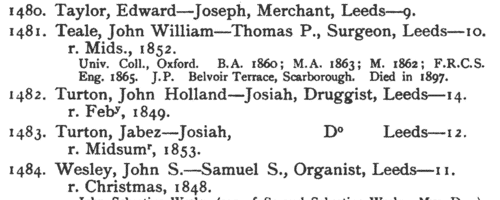Our indexes include entries for the spelling davis. In the period you have requested, we have the following 4,200 records (displaying 2,201 to 2,210):
Bankruptcy meetings
(1844)
Meetings for the allowance of bankrupts' certificates in England and Wales: a final stage before the discharge of a bankrupt | Sample scan, click to enlarge

|
Bankruptcy Meetings
(1844)
Meetings about bankrupts' estates in England and Wales | Sample scan, click to enlarge

|
Bankruptcy Meetings
(1844)
Meetings about bankrupts' estates in England and Wales | Sample scan, click to enlarge

|
Bankrupts' Assignees
(1844)
Assignees of bankrupts' estates (usually principal creditors and/or close relatives of the bankrupt) in England and Wales | Sample scan, click to enlarge

|
Boys entering Elizabeth College, Guernsey
(1844)
Elizabeth College, Guernsey, was founded in 1563 and rechartered in 1825. Charles James Durand, Kentish Brock and Edward Charles Ozanne compiled this edition of the college register, published in 1898. The names are arranged by term of entering the school, with a sequential number, surname and christian names in bold: then place and date of birth, father's name or reference to a brother previously at the school; and year of leaving. Beneath that, in smaller type, the compilers put what they could glean about the boy's subsequent career. | Sample scan, click to enlarge

|
Boys entering Leeds Grammar School
(1844)
The admission books for Leeds Grammar School from 1820 to 1900 were edited by Edmund Wilson and published in 1906. The series of registers is almost complete for the period, there being in addition admission registers for the Lower (or Commercial) Department from 1856 to 1865, and lists of boys in the school in 1856, and in the Commercial Department in 1861. The entries are arranged by date or term of admission: a sequential number is given first, then surname, christian name, and, after a dash, father's christian name, occupation, and address; another dash, and then the age of the boy at admission, and often his year of leaving (with the abbreviation r. for 'removed' or 'left'). r.* means left without notice; (o) or S. or Stranger or Foreigner indicates a boy not on the foundation. The editor was unable to divine the meaning of the abbreviation (Q) or the asterisks prefixed to most entries in 1856 to 1860, but dutifully copies them into the text. In smaller type he then proceeds, where possible, to add some information about the boy's subsequent career. | Sample scan, click to enlarge

|
Deaths, Marriages, News and Promotions
(1844)
Death notices and obituaries, marriage and birth notices, civil and military promotions, clerical preferments and domestic occurrences, as reported in the Gentleman's Magazine. Mostly from England and Wales, but items from Ireland, Scotland and abroad.
| Sample scan, click to enlarge

|
Deaths, Marriages, News and Promotions
(1844)
Death notices and obituaries, marriage and birth notices, civil and military promotions, clerical preferments and domestic occurrences, as reported in the Gentleman's Magazine. Mostly from England and Wales, but items from Ireland, Scotland and abroad.
| Sample scan, click to enlarge

|
Dissolutions of Partnerships
(1844)
Trade partnerships dissolved, or the removal of one partner from a partnership of several traders, in England and Wales
| Sample scan, click to enlarge

|
Insolvents
(1844)
Insolvency notices for England and Wales: insolvency often caused people to restart their lives elsewhere, so these are an important source for lost links | Sample scan, click to enlarge

|
Research your ancestry, family history, genealogy and one-name study by direct access to original records and archives indexed by surname.











